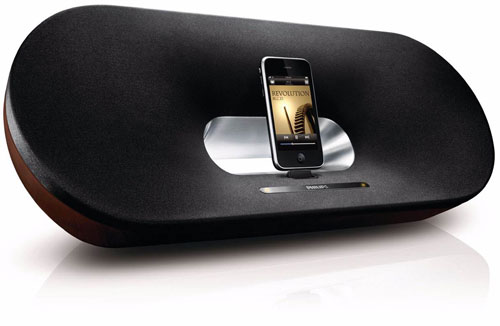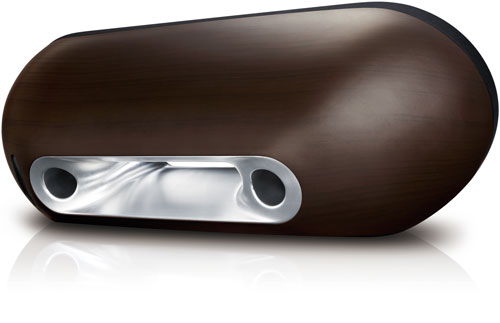
There are countless iDevice docks on the market, and Philips has a full range of offerings from budget to bank-balance bending. The Fidelio DS9000 falls squarely into the latter category. Priced at R3 999 and weighing 6,5kg, it’s heavy in many senses, including on the eyes, but is it worthy of the space it requires and the dent it’ll leave on your account balance?
Named after the only opera Ludwig van Beethoven composed, the Fidelio looks like an elongated donut with a chromed, hollow centre.
It’s not the prettiest dock to come through TechCentral’s office by any measure. The rear is finished in dark wood, and aside from the power-cable port, the only other connector you’ll find on its sleek derriere is a 3,5mm auxiliary jack.
The iPod/iPad/iPhone connecter that takes pride of place in the centre of the device is hinged and as soon as you connect a device to it you’re prompted to download the accompanying Fidelio application from Apple’s App Store.
Though the audio — which is covered in detail later in this review — is superb, the application is equally good. There are two version of the application, one for smaller devices like iPods and iPhones, and another for the iPad, and both offer a sleek, Apple-like control interface and the ability to stream thousands of digital radio stations.
The application offers additional information, like an analogue clock, and can work as an alarm. It displays local weather — all of which the iPad version manages to fit on a single screen — and both it and the smaller version of the app allow you to share information about what you’re listening to via Twitter or Facebook should you wish to annoy your followers.

For the audiophiles, there’s also a digital equaliser so you can further refine the already impressive sound to your personal preference, and for those whose obsession extends to knowing what’s playing at any given moment, integrated support from music database Gracenote means it’s possible to look up track information while using digital radio.
As far as physical buttons are concerned, the Fidelio makes do with a discreet, elongated volume rocker in the centre of the dock’s face, which also carries the Philips badge. There is no actual power button as the dock awakens when a device is connected and turns itself off when disconnected.
Similarly, the volume controls wake up when you approach the unit thanks to a proximity sensor and turn off again when no movement is detected for five seconds.
The dark wooden laminate rear consists of multiple layers of plywood that have been heated, bent and glued together using a technique usually reserved for furniture, as in the base of an Eames chair. This not only accounts for the weight of the unit, but for its ability to focus and project its audio from the front of the unit.
Philips also claims that all of the innards are noteworthy: from the best drivers the Dutch company could find to a pair of 4-inch subwoofers. That’s not to say it’s going to rattle the fillings in your teeth, but it can if you’d like it to.
Though the bass is impressive, it’s also well balanced with the mid and high tones, and everything we tried on it — from opera to metal to hip-hop — sounded superb. Considering the excellent audio and the range of features, after a few hours of use the R3 999 price tag doesn’t seem excessive at all.
If you’re serious about sound, you’ll want a serious looking device, and although we don’t think the Fidelio is the most attractive looking dock, in its price range it’s one of the most attractive sounding, and to us that seems far more important. — Craig Wilson, TechCentral
- Subscribe to our free daily newsletter
- Follow us on Twitter or on Google+ or on Facebook
- Visit our sister website, SportsCentral (still in beta)




